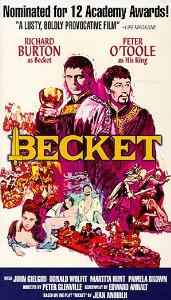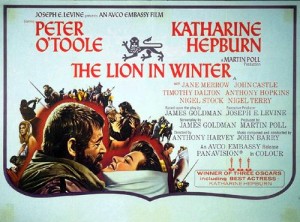 These two films—Becket (1964) and The Lion in Winter (1968)—star Peter O’Toole (propelled to the limelight by his stunning big-screen debut as T.E. Lawrence in Lawrence of Arabia) as England’s powerful Norman king, Henry II.
These two films—Becket (1964) and The Lion in Winter (1968)—star Peter O’Toole (propelled to the limelight by his stunning big-screen debut as T.E. Lawrence in Lawrence of Arabia) as England’s powerful Norman king, Henry II.
In Becket, Henry is young and eager to consolidate his power by dominating the church in England; to this end he appoints his beloved Saxon friend Thomas Becket (Richard Burton), whom he has already made Chancellor, Archbishop of Canterbury, primate of the English church. What Henry believed to be a savvy political ploy backfires, as the hitherto morally rudderless Becket finds an honourable cause in defending the Church of England and clashes with the king. Henry is crushed by the apparent betrayal of his only true friend and frustrated by his inability to neutralize his brilliant rival. He has Thomas killed.
The Lion in Winter gives us Henry at the ripe age of fifty, still robust and still scheming. He has imprisoned the ambitious and equally scheming queen, Eleanor of Aquitaine, but is having difficulty controlling his three ambitious sons. The film is set in the king’s castle at Chinon, where Henry has gathered his family, including Eleanor, as well as Philip, King of France, for a Christmas court. What ensues is an intricately vicious familial and diplomatic chess match involving intrigue, betrayal, chicanery, and guile. It is a match that in the end no one wins, but, oh, what a contest it is.
The Lion in Winter, a bit of Shakespearian cynicism directed at royal ambition, features one of the wittiest scripts I have ever seen brought to life in a film. The most deliciously wicked scenes go to Henry and Eleanor and the lines are delivered with perfect timing by O’Toole and Katharine Hepburn, who won the best actress Oscar for her performance.
The juiciest lines are Eleanor’s:
• On Philip of France (she is speaking with her three sons just after she arrives at Chinon): “Let’s hope he’s grown up like his father, Simon pure and Simon simple. Good, good Louis. If I had managed sons for him instead of all those little girls, I’d still be stuck with being queen of France and we should not have known each other. Such, my angels, is the role of sex in history.”
• On meeting Henry: “Henry was eighteen when we met and I was queen of France. He came down from the north to Paris with a mind like Aristotle’s and a form like mortal sin. We shattered the commandments on the spot.”
• On her love of travel: “I even made poor Louis take me on crusades. How’s that for blasphemy? I dressed my maids as amazons and rode bare-breasted half way to Damascus. Louis had a seizure and I damn near died of wind burn. (Long pause) But the troops were dazzled.”
• After a particularly rancorous exchange with the king in which Eleanor, now desperate as her sons are about to be incarcerated while Henry goes to Rome to seek an annulment of his marriage to the queen, tries to convince him that she slept with his father, she follows him to the door of the room and collapses on the floor as he flees screaming in anguish. She draws herself up to a near sitting position, faces the camera, and asks, “Well, what family doesn’t have its ups and downs?”
 The Lion in Winter is a masterpiece of a movie that feverishly paints human nature in its darkest hues. Becket is a lesser work of art—the screenplay is Lion’s feeble cousin—but it renders a nobler and more heroic portrait of man through its depiction of recovered honour and a life sacrificed for a higher principle. It is also a story of the deepest love, a love that is shattered by one man’s lust for power.
The Lion in Winter is a masterpiece of a movie that feverishly paints human nature in its darkest hues. Becket is a lesser work of art—the screenplay is Lion’s feeble cousin—but it renders a nobler and more heroic portrait of man through its depiction of recovered honour and a life sacrificed for a higher principle. It is also a story of the deepest love, a love that is shattered by one man’s lust for power.
In Lion, Henry’s residence at Chinon is presented as the antithesis of the fairy-tale castle as if to underscore the point that the life of a twelfth-century royal family was far from the often imagined world of embroidered gowns, elegant and splendid banquets, and genteel court manners. The squalid courtyard, the filthy dining hall, and the skeletal dogs roaming freely throughout the castle hallways reflect the state of the souls of its inhabitants. This gritty realism, along with the vastly superior script and the matchless performances of Hepburn and O’Toole, make The Lion in Winter a more satisfying viewing experience than Becket. Nevertheless, with its compelling story and some fine acting, the lesser film has merit of its own and is not to be dismissed.
Photo Credits
Becket Poster @ Wikipedia
The Lion In Winter Poster @ Wikipedia
Recent Ross Lonergan Articles:
- The Film-School Student Who Never Graduates: A Profile of Ang Lee, Part Four
- The Film-School Student Who Never Graduates: A Profile of Ang Lee, Part Three
- The Film-School Student Who Never Graduates: A Profile of Ang Lee, Part Two
- The Film-School Student Who Never Graduates: A Profile of Ang Lee, Part One
- Bullying, Fear, And The Full Moon (Part Four)


I shall need to see it again before answering your question. Dark is pretty grim. Comedy…hmmm…not sure as one person’s comedy is not the nexts..
I need to refresh my memory before passing a sensible comment. But , I appreciate your reponse to mine. I am looking forward to your next review.
Dear Granny:
Thanks for your comment. I was writing a review of the romantic comedy “It’s Complicated” recently and it somehow occurred to me that “The Lion in Winter” is a kind of dark, medieval romantic comedy. What say you about this?
Hey there Ross, Thanks again are due to you. This time for reminding us all, about the wonderful film ” A Lion in Winter.”.
I have seen it several times and always find something I missed the first times around. Devoted as I am to both superb actors, I often miss background and etc. You have brought it to the fore, which means I have to seek this film again to fully enjoy it , mainly with your article in mind.
My son recently lent me a huge DVD series : ‘Kung Fu ‘with the superb David Carradine so if anyone steps on my toes these days, I am ready to respond, however, only after deep contemplation of should I or not. 🙂
How wonderful this world could and should be , if we all followed the quietness in our beings to take over.. What a tragic and senseless death David endured.
Thanks again for taking us all to the movies. Keep it up, please.